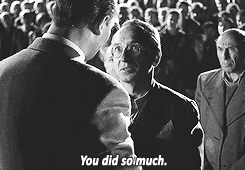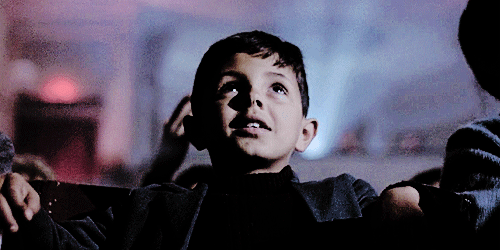Harold Abrahams
Harold Abrahams is a student in University of Cambridge who has to struggle his way to fit in the British class society because of what he is, a Jewish. Due to his experiences of facing prejudice and discrimination because of what his religion is, Harold seem to have the need to prove to everyone that he is worth it and can be respected if he works hard on the things he want to achieve. He wants people to believe that he is able to be a self-made man. And this had become his main motivation on running on the tracks and win them.
But winning might not be enough for Harold because he still have a sense of meaningless after winning the gold medal. We can see it in the scene where he celebrates his winning by drinking with his coach. He strive for perfection and he needs that recognition from people to approve that what he did was flawless. But as human we never going to be perfect. This may be connected to Alfred Adler's criticism on achieving perfection and self-actualization in life. Alfred Adler came up with the idea of inferiority complex, where human feels the need to be perfect but ended up not being happy with the results. Human strives to overcome the inferiority and in Abraham's case, he has the need to be recognized as one of the Englishman which denies the fact that he was born Jewish.
Harold also fails to see the bigger picture of winning the medal. For him winning it is everything and is almost going to magically solves all of his issues in life. He even hurt his lover's feeling by being too obsessed with winning that he would do anything to win it. I have a feeling things might turn way worse if Harold actually did not win the gold medal. He fails to see that life goes on after the competition and the strive for self-actualization is a never ending process. He also fails to see that in life, nothing is perfect.
Eric Liddell
Eric Liddell is Scottish and a son of missionaries in China. Eric sees the opportunity to run on the track as a way to show people the existence of God. Eric is aspire to spread his belief by winning the medal. His main goal to win the medal in Olympic is to show how his religious belief can be the reason for him to strive harder and he also believes that running is a talent given by God. By running so fast on the tract means that he glorify God's given ability to him. Eric said this to his sister who is mad that he missed the prayer because of running: "I believe God made me for a purpose, but He also made me fast. And when I run I feel His pleasure."
When his belief is tested, which is the schedule of the competition that has to make Eric run on Sabbath day, which is Sunday, he stands strong to his belief and refuse to obey. Even when being persuade by Prince of Wales, he remains strong with his belief that God is more powerful than man. He beliefs that he shouldn't be afraid of anything at all if he is on the God's side. Eric manages to get the approval to run on different day and this is already a winning moment for him. He proves his devotion to God, and there is nothing more sweet than the grace from God. This balanced of winning the race for the title and winning it for a good cause have made Eric Liddell achieved the self-actualization.
After winning the gold medal, Eric kept his promise to his sister and continues to serve as missionary in China. For Eric winning the gold medal already proved the power of God, and his main goal of winning it is achieved, mainly because it is achievable unlike the strive of perfection by Harold. Eric understands the meaning of living the life meaningfully, and he understands that winning the Olympic shouldn't be the only main achievement to be proud of in life. Once its done, he moves on to another cause, keep on striving to be happy and keep on gaining the self-actualization.
All in all this movie is not great only because of the story of the competition itself, but it covers many aspects that are relatable to many people. From the silent and stressful scene before the competition starts to the backgrounds o these two great runners. Other than that, the soundtrack and the music used in this film are major parts of why this movie is nostalgic and great.



































